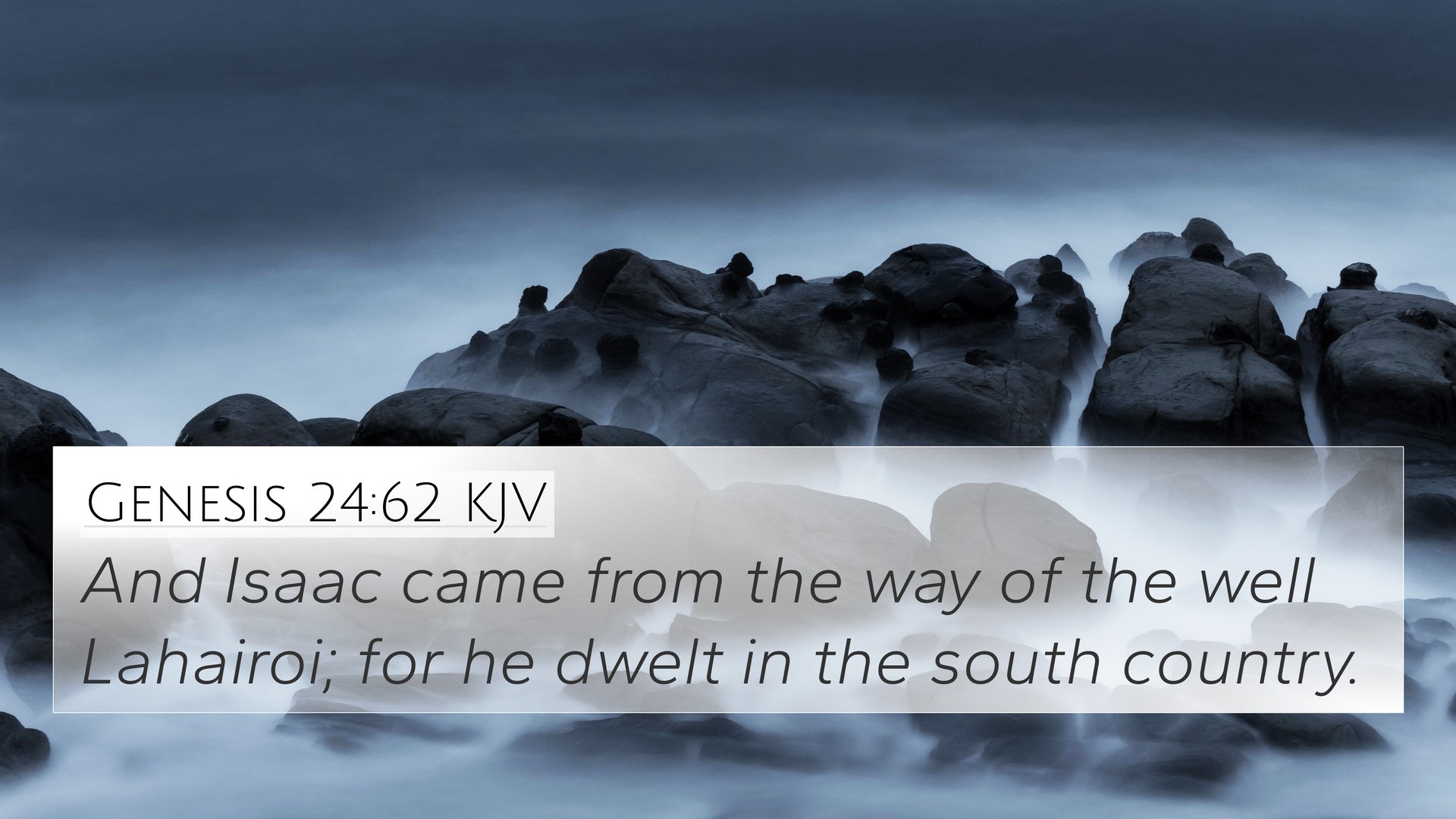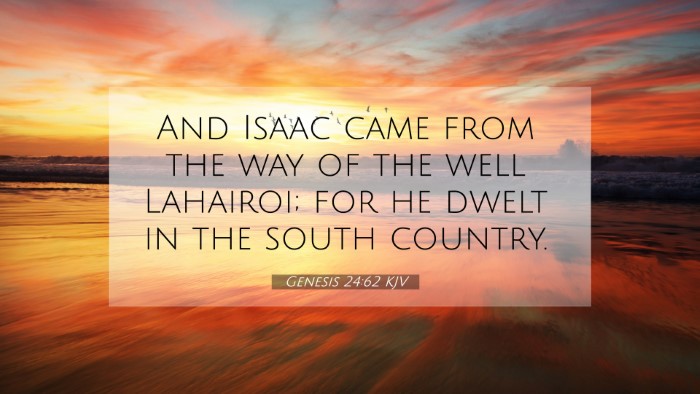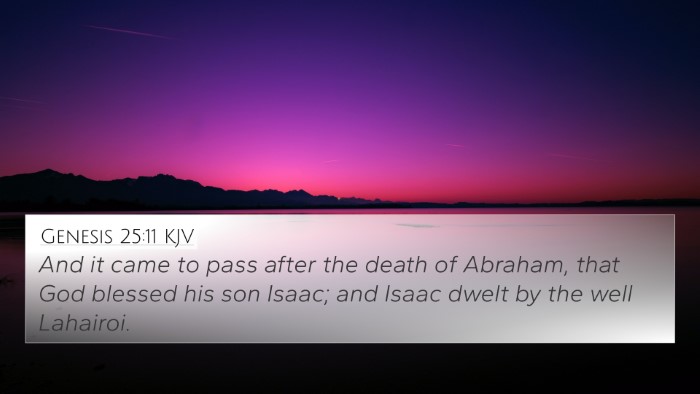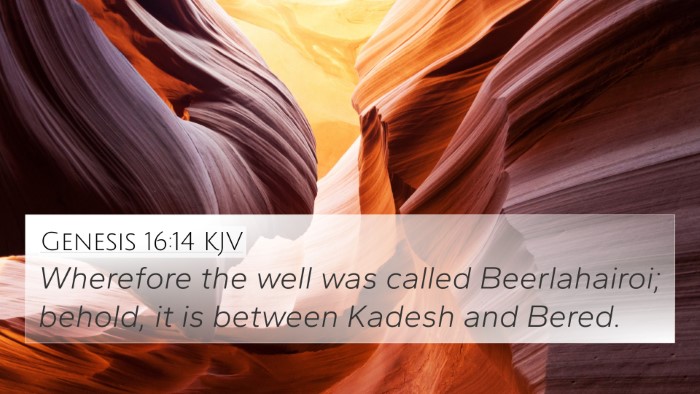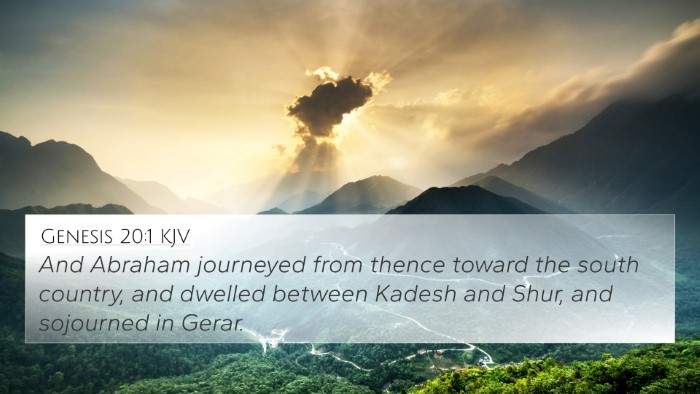Understanding Genesis 24:62
Verse Reference: Genesis 24:62 - "And Isaac came from the way of the well Lahai-roi; for he dwelled in the south country."
Summary of Meaning
This verse narrates a pivotal moment in the life of Isaac, indicating his return to inhabit the area from which he came, which is referred to as Lahai-roi. This location holds significance as it symbolizes a place of divine insight and presence. The mention of "the south country" highlights the geographical context of Isaac's life and provides an understanding of the familial and covenantal promises made by God.
In-Depth Analysis
Drawing from various public domain commentaries:
- Matthew Henry: Henry emphasizes the importance of location in the biblical narrative, suggesting that Lahai-roi is not just a geographical marker but a place where God has provided guidance and met the needs of His people. Isaac's journey is seen as a reflection of God’s promises and faithfulness.
- Albert Barnes: Barnes notes that this verse indicates Isaac's obedience and his connection with the covenant made with Abraham. The mention of Lahai-roi points to the provision of God, as this well was discovered by Hagar, illustrating God's concern for all peoples, not just the chosen lineage of Abraham.
- Adam Clarke: Clarke refers to this verse in the context of the importance of wells in biblical times and notes that Lahai-roi signifies "the well of the Living One who sees me." This underscores God's omnipresence and awareness of each individual's circumstances.
Key Themes and Implications
The verse highlights several themes relevant to understanding the broader narrative of Genesis:
- Divine Providence: Isaac’s return signifies God’s ongoing guidance in his life, reinforcing the principle that God is aware of and involved in the lives of His followers.
- Spiritual Significance of Place: The location of Lahai-roi serves as a reminder of God’s promises and encounters in specific locations throughout biblical history.
- Family Lineage and Covenant: Isaac’s journey back to the south country holds implications for the continuity of God’s covenant with Abraham and his descendants.
Cross-References
Genesis 24:62 connects to several other Bible verses that provide depth and understanding to its meaning:
- Genesis 16:14: Referring to the well Lahai-roi.
- Genesis 21:19: Hagar's experience at the well, displaying God's provision.
- Genesis 25:11: Isaac's relationship to the land and God’s promises.
- Genesis 12:1-3: The covenant promises made to Abram, applied to Isaac.
- Exodus 3:6: God revealing His presence to the patriarchs.
- John 4:10-14: Christ as the living water, reflecting the spiritual significance of wells.
- Hebrews 11:9-10: The faith of Abraham and his lineage’s connection to the land.
- Psalms 103:19: Emphasizing God's sovereignty over the earth.
- Isaiah 43:2: God's promise to be with His people in their journeys.
- Romans 4:13: The promise to Abraham and his heirs, including Isaac.
Conclusion
Genesis 24:62 serves as a reminder of God's ongoing presence and action in the lives of His chosen people. The return of Isaac from Lahai-roi encapsulates the themes of divine guidance, the spiritual significance of places, and the connection to God’s covenant promises. By exploring this verse through various commentaries and biblical cross-references, one can gain a richer understanding of its implications within the biblical narrative.
Utilizing Cross-References in Bible Study
When studying the Bible, understanding how verses connect to each other can enhance comprehension and application. Tools for Bible cross-referencing, such as a Bible concordance or cross-reference guide, can help identify relationships between verses that support specific themes. This facilitates a deeper understanding of scriptural cross-referencing, as well as comparing themes across both testaments. Whether preparing sermons or ensuring a comprehensive understanding of scripture, cross-referencing enhances biblical study methods.
